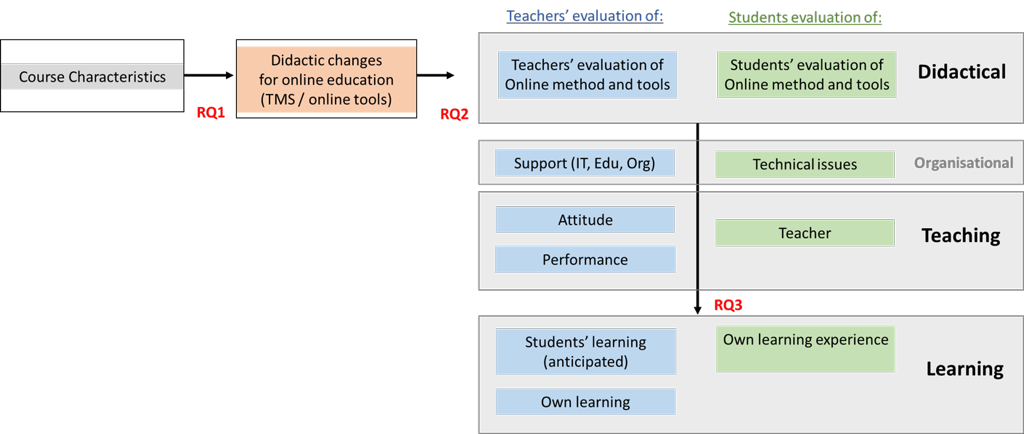Project introduction and background information
The global corona pandemic has forced an abrupt transition to online education. Although there is some knowledge (both scientific and practical knowledge) about the factors that contribute to the effective adoption of online teaching methods, the crisis situation of today presents an entirely new set of circumstances that has never been witnessed before. On the one hand, the limitation of physical contact forces the sudden move to ‘online only’ without proper preparation, which presents teachers and universities with a serious challenge. On the other hand however, this crisis situation provides a window of opportunity for educational innovation as it changes the attitudes and risk-reward balance (there is no choice), increases the available resources and attention for online education, and triggers all sorts of experimentation with ICT tools, teaching methods and new forms of organization. The current transition to online education thus provides a unique opportunity to learn about the factors that contribute to educational innovation and the effective adoption of online tools.
Objective and expected outcomes
This research aims to provide insights into the factors that shape the effective adoption of online education at Wageningen University.
The results can support educational policy of universities for online teaching, and contribute to a scientific understanding of the adoption of online education.
The main research question that we aim to address in this study is: How does the move to online education influence course didactics, teaching and the learning performance of students?
- What changes are made in teaching methods for different type of courses?
- How are the different type of teaching methods and adaptations experienced and evaluated by students and teachers?
- How do the different type of teaching methods and adaptations affect the learning of students, and what is the role of teachers’ attitude, performance and perceived organizational support in this?
We will thus study how the effective adoption of online teaching methods is shaped by:
- The individual attitude of teachers and students towards the educational innovation in this crisis situation in general, and towards online teaching and learning methods in particular.
- The course design; the type of teaching and learning activities, intended learning objectives and assessment method.
- The choice of online tools and methods to address these course design elements, how the tools are used in practice by teachers and students, and how they experience and evaluate the use of these tools.
- The course of time; in particular the perceived newness of the innovation and crisis situation, and the adaptation by students, teachers and the organisation (e.g. improvements of education support.
The figure attached illustrates the theoretical model based on our current understanding (scientific literature + educational experts at WUR), and will be tested and refined through empirical investigation.
Results and learnings
This project comprises a two-staged research design, which includes a 'full-breadth' and 'in-depth' study;
- descriptive quantitative analysis to identify patterns (correlations) between course characteristics, changes in didactics, organizational support, teaching and learning ('full-breadth study')
- comparative case study based on qualitative research to better understand the complex interplay between factors in the adoption of specific online teaching methods (lectures with Virtual Classroom, groupwork with Microsoft Teams, and lab-practicals with Labbudgy and/or H5P)
This project will provide insights into how course design characteristics (objectives, activities, assessment) correlate with the use specific online tools, but also how these online tools are used in practice and evaluated by both teachers and students.
This project will provide insights into how students, teachers and the organization adapt to the crisis situation, by comparing two teaching periods (March-May/May-June).
This project has come to and end by June 2021. The results of the two teaching periods as well as the final key results can be viewed in the downloads section.
Recommendations
This projects aims to provide insights that are relevant for WUR, 4TU.cee, other universities, and higher education in general.
Please get in touch if you have questions, suggestions or know of similar projects. We are keen to hear from you.
Practical outcomes
The first results (June 2020 + September 2020) of the study, as well as the final key results (2021) can be viewed in the downloads section.
